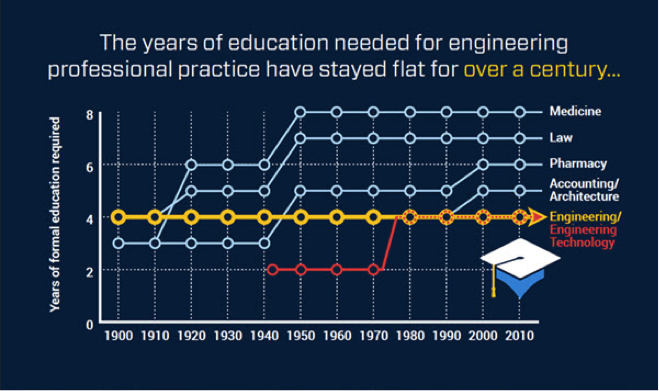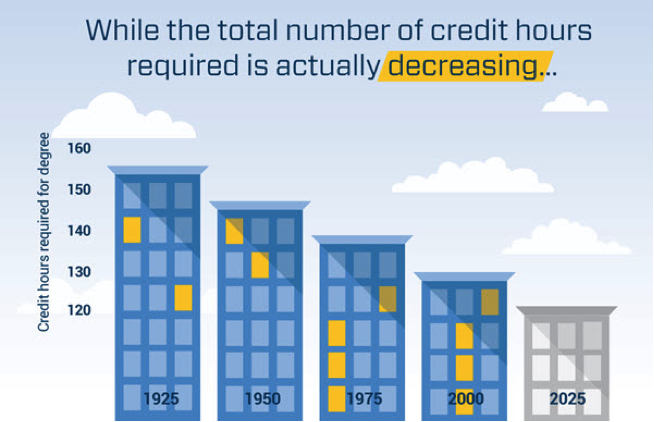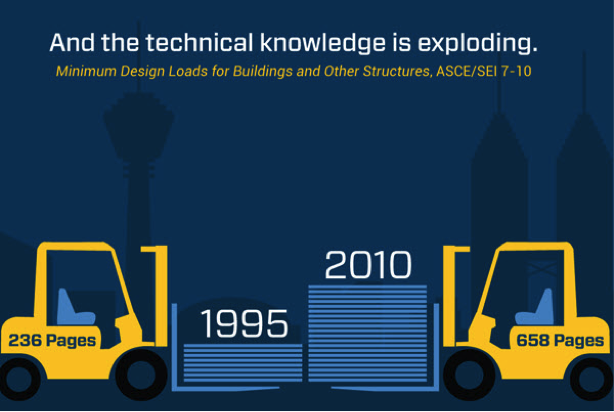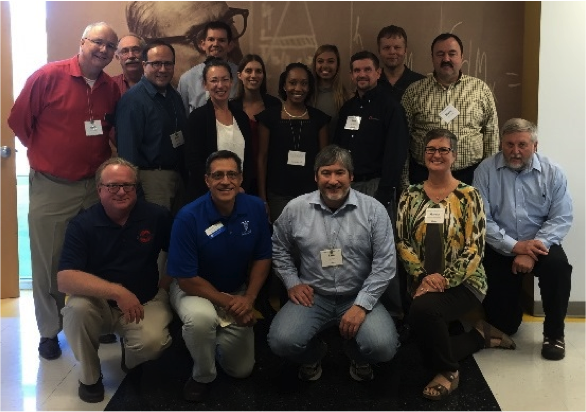By Linda Kaplan, PE
 “Raise the Bar” is one of three Strategic Initiatives set by the National office of the American Society of Civil Engineers (ASCE). According to National, “The Raise the Bar initiative seeks to ensure that those who practice engineering as licensed professionals (PEs) in the future have attained the body of knowledge necessary to protect the public health, safety, and welfare. Since entry into professional practice is regulated by state engineering licensure laws, the Raise the Bar initiative aims to amend state law so that additional education beyond the bachelor’s degree—a master’s degree or an equivalent 30 credits of graduate or upper-level undergraduate courses—is required of those who become licensed engineers in the future.”
“Raise the Bar” is one of three Strategic Initiatives set by the National office of the American Society of Civil Engineers (ASCE). According to National, “The Raise the Bar initiative seeks to ensure that those who practice engineering as licensed professionals (PEs) in the future have attained the body of knowledge necessary to protect the public health, safety, and welfare. Since entry into professional practice is regulated by state engineering licensure laws, the Raise the Bar initiative aims to amend state law so that additional education beyond the bachelor’s degree—a master’s degree or an equivalent 30 credits of graduate or upper-level undergraduate courses—is required of those who become licensed engineers in the future.”
The case for additional education requirements is strong and well represented by the following series of graphics:

Engineering used to be one of the most highly education intensive professions. However, over the past 100 years the engineering education requirements have been surpassed by those of other licensed professions. Many have expressed concern that increasing the education requirements will drive the “best and brightest” from choosing engineering as a profession. This is not the case in other licensed professions, and the fear is without factual support. In fact, the opposite effect may be seen: by “raising the bar,” engineering will gain prestige as a profession that clearly competes with medicine and law.

So why not just increase the credit hours required for the Bachelor’s Degree?
The total number of credit hours required for a degree is set by those outside of the engineering profession. State governments are often the decision making party, mandating a maximum number of credit hours for a degree in publicly funded universities – regardless of what that degree is in. To maintain enrollment, privately funded universities have followed the policy of the publicly funded universities, so the issue is universal. Additionally, the credit hours earned for an engineering Bachelor’s degree now have a higher percentage of non-technical content. While such non-technical content is essential to developing high quality engineering graduates able to advocate for and communicate their work to others, the technical content has diminished as a result. To protect the public, technical engineering education requirements that have been deleted in the baccalaureate degree must now be required in post-graduate education to earn the professional status of Professional Engineer (PE).

Pages in an engineering or building code are one example of how much the body of knowledge has expanded. New technology has provided more material for students to master.
Examples of technical knowledge that is often expected of entry level engineers today that wasn’t necessary in the past include:
- computer-aided design (CAD),
- geographic information systems (GIS),
- building information modeling (BIM),
- sustainability, and
- nanotechnology
These subjects are in addition to the core engineering mechanics foundation which we all know and love. Overall the profession has “more to know and less time to learn it.”
The process to update the licensure laws is long and takes many years to accomplish. No one with a current license, or even currently enrolled in an engineering education program, will be impacted by these proposed changes. The first step in this process is to build relationships with state government public policy makers and gain their support for the Raise the Bar initiative. Establishing a “licensing board liaison” within the state is one action that will enable efficient flow of information from professionals to those public policy makers who govern the professional practice requirements.
ASCE has identified a few states that have shown interest in moving forward to Raise the Bar. At this time, no legislation has been brought up for vote on the initiative. Currently, the focus is on New Jersey where legislation is anticipated within a couple years. ASCE estimates that 5 years may pass before the first state laws change, and another 3-5 after that before the second state changes. Research reveals that when 7 states adopt a change, an initiative has reached “critical mass”, and other states start to follow more quickly. Estimates on getting to critical mass for Raise the Bar are around 15 years.
The Raise the Bar initiative is about the future. Society will continue to expect more from its engineers and we need to be prepared to provide it. The current engineering education has served us well, and no one is questioning the ability of currently licensed professionals to perform their jobs well. But we recognize that the world and industry are changing and that future engineers need to be equipped with a larger Body of Knowledge to continue to serve at the same level of expertise and public safety, and cost-effectiveness that we presently achieve.
 On September 9 & 10, 2016, Pittsburgh Section Members Azekah Griffiths, P.E. of FZA, LLC and Linda Kaplan, P.E. of TRC attended the Raise the Bar Advocate/Champion Workshop in St Louis, Missouri. Twenty ASCE members attended from the contiguous United States. The objective of the workshop was to train attendees on how to communicate the Raise the Bar for Engineering initiative in their home state to ensure that accurate information is provided both to ASCE members, public policy makers and other interested parties.
On September 9 & 10, 2016, Pittsburgh Section Members Azekah Griffiths, P.E. of FZA, LLC and Linda Kaplan, P.E. of TRC attended the Raise the Bar Advocate/Champion Workshop in St Louis, Missouri. Twenty ASCE members attended from the contiguous United States. The objective of the workshop was to train attendees on how to communicate the Raise the Bar for Engineering initiative in their home state to ensure that accurate information is provided both to ASCE members, public policy makers and other interested parties.
ASCE has many good resources available in a Raise the Bar tool kit. To learn more or contribute your expertise, contact Azekah and Linda, both of whom are familiar with these resources and are available to answer additional questions about Raise the Bar. The section is actively seeking interested parties to help move this initiative forward.
